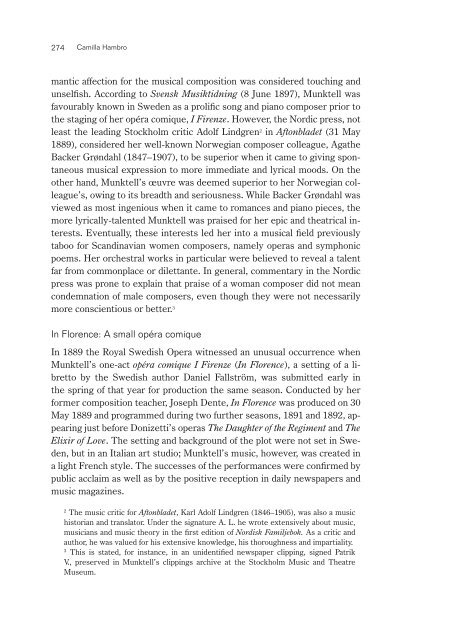Opera on the Move in the Nordic Countries during the Long 19th ...
Opera on the Move in the Nordic Countries during the Long 19th ...
Opera on the Move in the Nordic Countries during the Long 19th ...
You also want an ePaper? Increase the reach of your titles
YUMPU automatically turns print PDFs into web optimized ePapers that Google loves.
274 Camilla Hambro<br />
mantic affecti<strong>on</strong> for <strong>the</strong> musical compositi<strong>on</strong> was c<strong>on</strong>sidered touch<strong>in</strong>g and<br />
unselfish. Accord<strong>in</strong>g to Svensk Musiktidn<strong>in</strong>g (8 June 1897), Munktell was<br />
favourably known <strong>in</strong> Sweden as a prolific s<strong>on</strong>g and piano composer prior to<br />
<strong>the</strong> stag<strong>in</strong>g of her opéra comique, I Firenze. However, <strong>the</strong> <strong>Nordic</strong> press, not<br />
least <strong>the</strong> lead<strong>in</strong>g Stockholm critic Adolf L<strong>in</strong>dgren 2 <strong>in</strong> Aft<strong>on</strong>bladet (31 May<br />
1889), c<strong>on</strong>sidered her well-known Norwegian composer colleague, Aga<strong>the</strong><br />
Backer Grøndahl (1847–1907), to be superior when it came to giv<strong>in</strong>g sp<strong>on</strong>taneous<br />
musical expressi<strong>on</strong> to more immediate and lyrical moods. On <strong>the</strong><br />
o<strong>the</strong>r hand, Munktell’s œuvre was deemed superior to her Norwegian colleague’s,<br />
ow<strong>in</strong>g to its breadth and seriousness. While Backer Grøndahl was<br />
viewed as most <strong>in</strong>genious when it came to romances and piano pieces, <strong>the</strong><br />
more lyrically-talented Munktell was praised for her epic and <strong>the</strong>atrical <strong>in</strong>terests.<br />
Eventually, <strong>the</strong>se <strong>in</strong>terests led her <strong>in</strong>to a musical field previously<br />
taboo for Scand<strong>in</strong>avian women composers, namely operas and symph<strong>on</strong>ic<br />
poems. Her orchestral works <strong>in</strong> particular were believed to reveal a talent<br />
far from comm<strong>on</strong>place or dilettante. In general, commentary <strong>in</strong> <strong>the</strong> <strong>Nordic</strong><br />
press was pr<strong>on</strong>e to expla<strong>in</strong> that praise of a woman composer did not mean<br />
c<strong>on</strong>demnati<strong>on</strong> of male composers, even though <strong>the</strong>y were not necessarily<br />
more c<strong>on</strong>scientious or better. 3<br />
In Florence: A small opéra comique<br />
In 1889 <strong>the</strong> Royal Swedish <str<strong>on</strong>g>Opera</str<strong>on</strong>g> witnessed an unusual occurrence when<br />
Munktell’s <strong>on</strong>e-act opéra comique I Firenze (In Florence), a sett<strong>in</strong>g of a libretto<br />
by <strong>the</strong> Swedish author Daniel Fallström, was submitted early <strong>in</strong><br />
<strong>the</strong> spr<strong>in</strong>g of that year for producti<strong>on</strong> <strong>the</strong> same seas<strong>on</strong>. C<strong>on</strong>ducted by her<br />
former compositi<strong>on</strong> teacher, Joseph Dente, In Florence was produced <strong>on</strong> 30<br />
May 1889 and programmed dur<strong>in</strong>g two fur<strong>the</strong>r seas<strong>on</strong>s, 1891 and 1892, appear<strong>in</strong>g<br />
just before D<strong>on</strong>izetti’s operas The Daughter of <strong>the</strong> Regiment and The<br />
Elixir of Love. The sett<strong>in</strong>g and background of <strong>the</strong> plot were not set <strong>in</strong> Sweden,<br />
but <strong>in</strong> an Italian art studio; Munktell’s music, however, was created <strong>in</strong><br />
a light French style. The successes of <strong>the</strong> performances were c<strong>on</strong>firmed by<br />
public acclaim as well as by <strong>the</strong> positive recepti<strong>on</strong> <strong>in</strong> daily newspapers and<br />
music magaz<strong>in</strong>es.<br />
2 The music critic for Aft<strong>on</strong>bladet, Karl Adolf L<strong>in</strong>dgren (1846–1905), was also a music<br />
historian and translator. Under <strong>the</strong> signature A. L. he wrote extensively about music,<br />
musicians and music <strong>the</strong>ory <strong>in</strong> <strong>the</strong> first editi<strong>on</strong> of Nordisk Familjebok. As a critic and<br />
author, he was valued for his extensive knowledge, his thoroughness and impartiality.<br />
3 This is stated, for <strong>in</strong>stance, <strong>in</strong> an unidentified newspaper clipp<strong>in</strong>g, signed Patrik<br />
V., preserved <strong>in</strong> Munktell’s clipp<strong>in</strong>gs archive at <strong>the</strong> Stockholm Music and Theatre<br />
Museum.
















